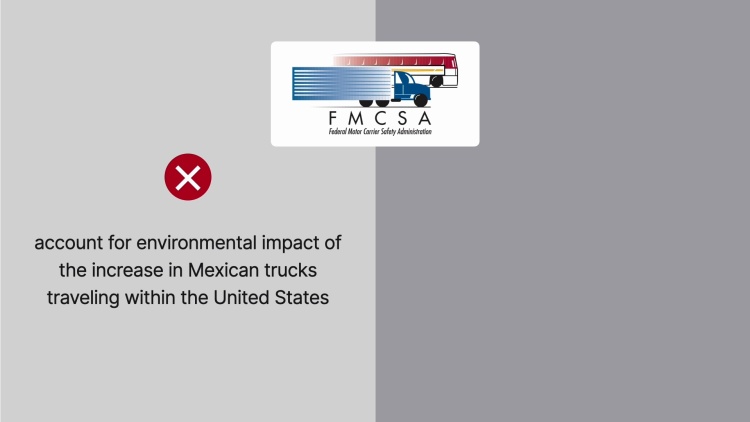Department of Transportation v. Public Citizen
United States Supreme Court
541 U.S. 752, 124 S.Ct. 2204, 159 L.Ed.2d 60 (2004)
- Written by Craig Conway, LLM
Facts
The North American Free Trade Agreement, signed in 1982 by the United States, Mexico, and Canada, provided for the lifting of a moratorium to allow Canadian and Mexican trucks and buses to operate in the United States. While the Canadian moratorium was lifted quickly, the President extended the moratorium on Mexican carriers until the Federal Motor Carrier Safety Administration (FMCSA), an agency within the U.S. Department of Transportation, promulgated Application and Safety Monitoring Rules (the Rules) governing the operation of Mexican trucks and buses in the United States. Pursuant to the National Environmental Policy Act (NEPA) and regulations promulgated by the Council on Environmental Quality (CEQ), FMCSA prepared an Environmental Assessment (EA) stating that there would be no significant environmental impacts resulting from the agency’s issuance of the Rules. Public Citizen and other environmental interest groups (plaintiffs) filed petitions in the federal court of appeals seeking judicial review of the Rules, arguing they violated NEPA and the Clean Air Act (CAA). The court of appeals agreed and concluded the EA was deficient because it failed to adequately consider the overall environmental impact of lifting the moratorium on the cross-border operation of Mexican motor carriers. The U.S. Supreme Court granted certiorari to review.
Rule of Law
Issue
Holding and Reasoning (Thomas, J.)
What to do next…
Here's why 907,000 law students have relied on our case briefs:
- Written by law professors and practitioners, not other law students. 47,100 briefs, keyed to 996 casebooks. Top-notch customer support.
- The right amount of information, includes the facts, issues, rule of law, holding and reasoning, and any concurrences and dissents.
- Access in your classes, works on your mobile and tablet. Massive library of related video lessons and high quality multiple-choice questions.
- Easy to use, uniform format for every case brief. Written in plain English, not in legalese. Our briefs summarize and simplify; they don’t just repeat the court’s language.





